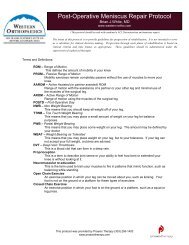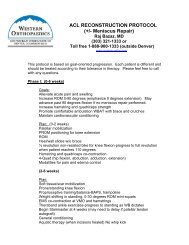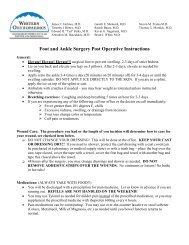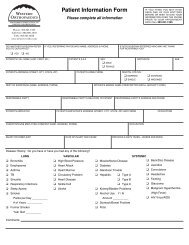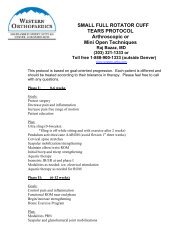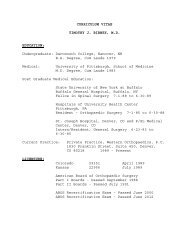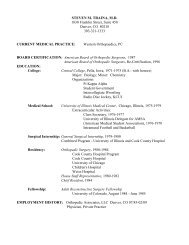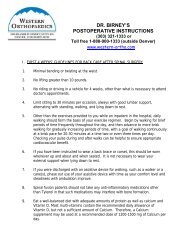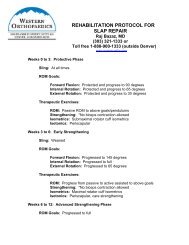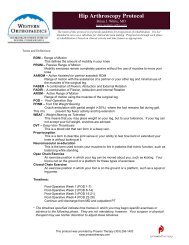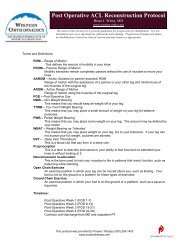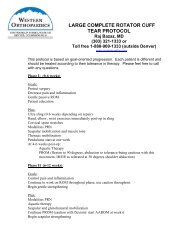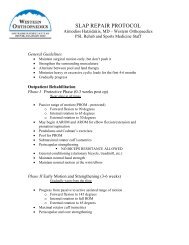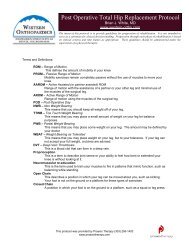Anterior Hip
Anterior Hip
Anterior Hip
- No tags were found...
Create successful ePaper yourself
Turn your PDF publications into a flip-book with our unique Google optimized e-Paper software.
AnticoagulationAnticoagulants are also known as “blood thinners”.These medications are used to help prevent bloodclots and to treat blood clots that have alreadyformed.People who are undergoing joint replacementsurgery are at a higher risk for forming blood clots.MedicationsThe two most commonly used options for bloodthinning medications are an injection or tablet.Typical medications include Fragmin, Heparin,Lovenox, Coumadin or aspirin. Your surgeon willdetermine which is best for you.CoumadinDescriptionCoumadin is a blood thinner that prevents bloodclotting. It is available in many different strengthsand in tablet form. This is an extremely effectivemedication, but needs to be monitored closely. Youwill be started on Coumadin while you are inhospital. Before you are discharged, the pharmacistor nurse will discuss with you common sideeffects, medications and foods you should avoidwhile on it.How does it work?Coumadin blocks the formation of Vitamin Kdependent clotting factors in your liver. Vitamin Kis needed to make clotting factors that help theblood to clot and prevent bleeding. Therefore, bygiving a medication that blocks the clotting factors,your body can stop harmful clots from forming orincreasing in size.Blood TestsWhile you are in the hospital, blood tests will bedone by the lab to measure how long it takes foryour blood to clot. These blood tests are calledProthrombin Time/International Normalized Ratio.(PT/INR). Based on the PT/INR, your Coumadindose will be adjusted carefully to fit yourcondition. You will need to have your PT/INRchecked on a regular basis while you are on thismedication. Your blood will be tested on yourfollow-up visit to your surgeons office once youleave the hospital.Special Precautions• Call your physician immediately if you haveany bleeding or bruising• Do not take ANY prescriptions or over-thecountermedications, including vitamins orherbal preparations (especially thosecontaining Vitamin E or K) unless ordered byyour physician• Try to maintain a consistent diet. Do notdramatically vary your dietary intake of foodshigh in Vitamin K as these foods can interferewith how you metabolize Coumadin.Examples of these foods include: spinach,broccoli, liver, cauliflower, cabbage, lentils,chickpeas, seaweed, soybean oil, green teaand other teas which contain coumarin.• Inform your doctor, dentist and pharmacistthat you are taking Coumadin, especiallybefore you start a new medication or arehaving a new medical or surgical procedure.RisksBecause Coumadin prevents blood clotting,patients taking Coumadin are at a higher risk forbleeding and bruising. People taking Coumadinmust have routine blood testing in order tomonitor its effect as well as minimize risksof bleeding.Contact InformationWhile in the hospital, if you have any questionsor notice any bleeding problems, you should notifyyour nurse and physician. If you notice any bleedingproblems while you are at home, please call yourphysicians office.



